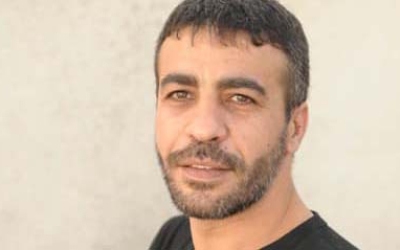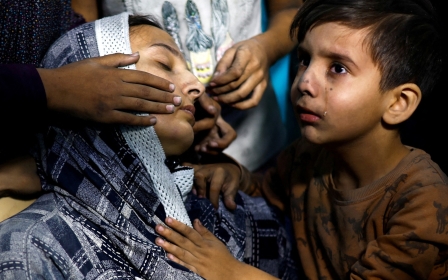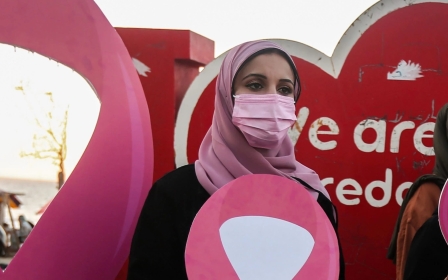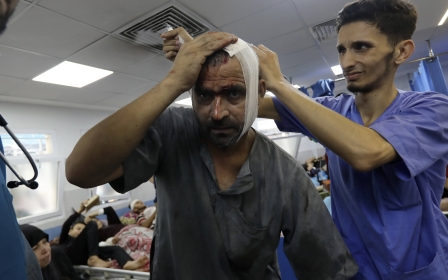Israel-Palestine war: Gaza siege leaves cancer patients without treatment
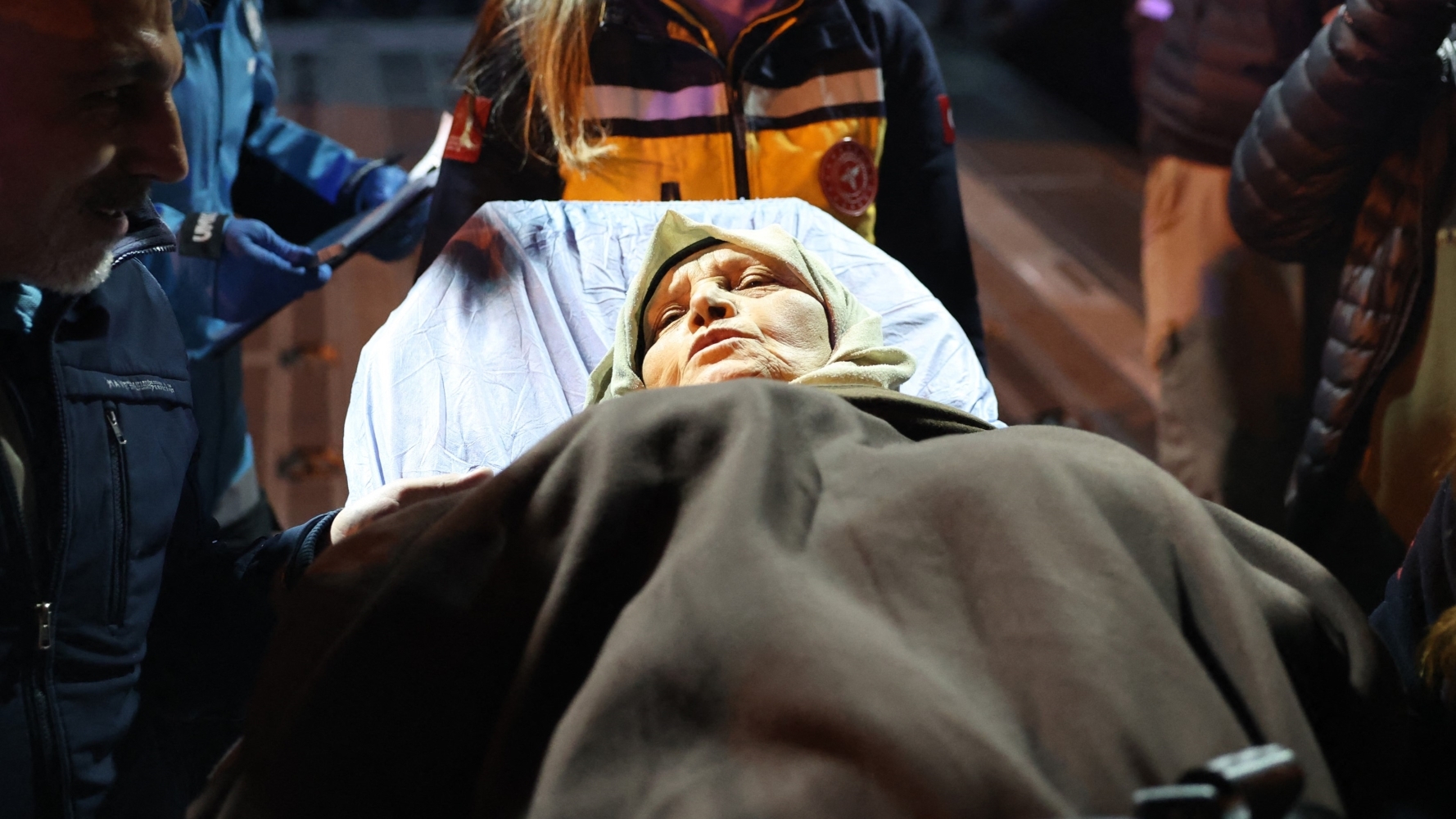
Despite having no prior medical conditions, and being an athlete, Ahmed al-Yaqoubi, a Palestinian from Gaza, was diagnosed with blood cancer in February 2021.
The 28-year-old's diagnosis was a turning point in his life, as his immunity plummeted, Yaqoubi went from a normal life to needing two units of blood a week.
Due to the severity of his condition, Yaqoubi was transferred from the al-Rantisi hospital in Gaza to the an-Najah hospital in the occupied West Bank city of Nablus.
"After undergoing a biopsy of my body and undergoing comprehensive tests, it became clear that the type of leukaemia I had was MDS [myelodysplastic syndrome], a rare form of leukaemia, requiring a marrow transplant,” Yaqoubi told Middle East Eye.
Doctors in the Ichilov Hospital in Tel Aviv found that his condition was unusual, as it typically affects individuals over the age of 65 or those exposed to strong chemical radiation.
Since his diagnosis, he has moved between hospitals and been held up at checkpoints exhausting him further.
Since the war started on 7 October, and Israel imposed a siege on Gaza, Yaqoubi can no longer get ahold of medicine, crucial to his life prospects.
At least 26 hospitals in the besieged enclave have been rendered out of service since the start of the Israeli bombardment. Coupled with Israel cutting off aid, water, food, fuel and electricity into Gaza since 9 October, many Palestinians with critical illnesses are suffering.
‘I escaped death’
Israeli authorities were aware of the severity of Yaqoubi’s condition but securing treatment has been a difficult process nevertheless.
Following his diagnosis, he was forced to wait for over four hours at the Qalandiya checkpoint near Ramallah while attempting to get to Tel Aviv for treatment.
"I was extremely tired and exhausted, and it turned out that there was an issue with my transit permit from Nablus to Tel Aviv. The wait was agonising, and I could barely catch my breath."
In April 2021, he learnt that he had contracted Covid-19, and after recovering, needed to undergo a marrow transplant.
'Upon transferring patients to Dar es Salaam Hospital, four patients succumbed on the same day as their evacuation'
- Dr Sobhi Sukeyk, hospital director
Even after recovering, obtaining a permit to seek treatment in the occupied West Bank was challenging.
“I would leave my house at seven in the morning, and I wouldn't arrive at the hospital until four in the afternoon…I would be late for my appointments and there was no consideration for patients. Israeli occupation forces would conduct searches in an extremely harsh manner,” he said.
As his illness advanced, Yaqoubi's weight dropped from 86kg to 40kg. His chemotherapy treatments also caused damage to his nerves.
"The pain I experienced cannot be described. Until now, I suffer from pain in the nerves in my limbs. My immunity is currently very weak.
“I endured a lot, and later I learned that my condition was deemed hopeless, but thanks to God, I escaped death,” he added.
Struggling between life and death
Like many cancer patients, Yaqoubi’s life has changed dramatically since undergoing chemotherapy.
Today, he cannot leave his house without a face mask and cannot be exposed to the sun because the melanin layer under the skin has been destroyed by treatment, heightening the risk of skin cancer.
“Even with treatment, I struggle between life and death,” he says.
'The medication I was taking to relieve my pain and to try to prevent the immune system from attacking my entire body has stopped'
- Ahmed al-Yaqoubi, cancer patient
The ongoing war has dramatically worsened the chances of Palestinians in Gaza getting treatment for their critical conditions.
"It has become catastrophic since the start of the Israeli aggression on Gaza. The medication I was taking to relieve my pain and to try to prevent the immune system from attacking my entire body has stopped.
"Due to the deterioration of my health, I need to be reviewed at the hospital in the West Bank once or twice a month…my nervous system has begun to completely deteriorate, leading to severe pain in the nerves in my eyes and throughout my body."
With no painkillers in sight, Yaqoubi struggles to sleep for even an hour at night.
Dr Sobhi Sukeyk, the director of Gaza's Turkish-Palestinian Friendship Hospital, says that the hospital no longer functions following more than seven weeks of intense Israeli bombing on the besieged enclave.
“On November 2, the hospital staff and patients were forced to evacuate due to the complete depletion of fuel, making the operation of devices for preparing medicines for cancer patients impossible, and the cessation of the water and sanitation systems,” he told Middle East Eye.
The hospital’s windows and doors shattered as a result of the bombings and spreading panic amongst the patients. The oxygen supplies in the hospitals also stopped working.
Patients were relocated to the Dar Al-Salam Hospital in Khan Younis, in the south of the Gaza Strip, however, the hospital is not equipped to handle cancer patients, and lacks vital equipment.
Most of Gaza’s cancer patients are now left without treatment or medicine, causing their condition to deteriorate rapidly as Israeli bombing rages on.
"The total number of cancer patients in Gaza is 10,000, all of whom are suffering from severe pain. However, Dar es Salaam Hospital is currently accommodating only 12 cancer patients, and their condition is extremely challenging,” Dr Sukeyk explained.
"Upon transferring patients to Dar es Salaam Hospital, four patients succumbed on the same day as their evacuation,” he added.
Prior to Israel’s bombardment of Gaza, around 1,000 cancer patients were set to be referred for treatment abroad.
However, following Israel’s campaign against the enclave, the number of patients who now require medical treatment abroad has surged.
“Approximately 2,000 cancer patients now need to be seen abroad,” Dr Sukeyk explained.
However, as the air strikes continue, and the death toll rises daily, Dr Sukeyk says cancer patients will only be able to get treatment if the international community intervenes and safeguards the lives of thousands of cancer patients.
This article is available in French on Middle East Eye French edition.
Middle East Eye propose une couverture et une analyse indépendantes et incomparables du Moyen-Orient, de l’Afrique du Nord et d’autres régions du monde. Pour en savoir plus sur la reprise de ce contenu et les frais qui s’appliquent, veuillez remplir ce formulaire [en anglais]. Pour en savoir plus sur MEE, cliquez ici [en anglais].


